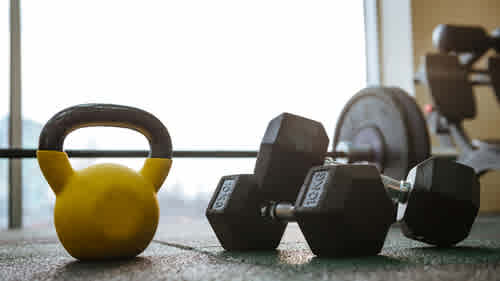
Quick Tips To Get Easy Relief From Sore Muscles Post Heavy Workout!

By Urban Company
4 min read
Mar 21, 2024
Your muscles are crying for help after your last workout. Here’s what you need to do next So, you’ve had a great workout and you’re on ...

Your muscles are crying for help after your last workout. Here’s what you need to do next
So, you’ve had a great workout and you’re on a high. You’ve pushed your body to its limits, and you’re excited about your next session. Except, a few hours after your workout, you’re suddenly experiencing discomfort. Sore muscles after gym aren’t an unusual phenomenon. In fact, there is a name for it: Delayed Onset Muscle Soreness (DOMS). And there are multiple ways to relieve sore muscles after gym. But before we find that out, let’s first understand what causes this soreness, if it’s good and if you can workout even when you’re sore.
What causes sore muscles after gym?
The primary cause of muscle soreness is when you engage in activities that your muscles aren’t typically used to. So it could be a heavy workout you tried out for the first time. Or it could be that you just walked on the treadmill for an hour when you’re not used to walking for more than ten minutes a day. Microscopic damage to muscle fibres, inflammation, and the release of chemicals contribute to this post-workout soreness.
Is muscle soreness after gym good?
Yes, it is. Muscle soreness may not be the most comfortable feeling but it’s also a sign that your muscles are adapting and getting stronger. It’s a natural part of the muscle-building process, indicating that your body is repairing and growing.
Should I stretch sore muscles?
Yes, you must stretch sore muscles but only gently. When you stretch, blood flows into the sore part and those muscles also gain some flexibility. However, don’t go overboard and stretch aggressively because that can actually damage your muscles. No matter your workout, make sure to include stretching into your cool-down routine.
Can I work out when sore?
Yes, you can. In fact, you shouldn’t let sore muscles just be. Engage in light, low-impact workout when you’re experiencing muscle soreness. However, also acknowledge that you’ve pushed your body beyond its usual limits so give it some time to recover.
8 tips to get relief from muscle soreness
Muscle soreness is a common phenomenon after a workout If anything, it’s a good sign that your muscles are actually building. But that does not mean that you should ignore sore muscles after gym. Here are some handy tips to get relief from muscle soreness.
Stay hydrated
Water helps transport nutrients that help in muscle recovery. On the other hand, dehydration makes muscle soreness worse. So, when you stay hydrated, you’re ensuring optimal cellular function that aids in the recovery process. Drink lots of water to recover from muscle soreness.
Rest up
As obvious as it may sound, this needs to be said. When you’re just finished with a heavy workout, you’re on an adrenalin high. You will want to push your body even further, try out an exercise you haven’t tried before, lift heavier weights than you just did, that sort of thing. Fight those instinct.
When you rest, your body releases growth hormone that is crucial for muscle repair and growth. Adequate sleep also enhances the production of proteins that repair damaged tissues, promoting recovery and reducing soreness.
Apply a heat pad
When you apply a heat pad to your sore muscles, you’re helping increase blood flow to the sore area. When the blood flow increases, the muscles also get more oxygen and nutrients. This helps the muscles relax and reduce stiffness by enhancing the elasticity of connective tissues.
Apply cold compress
When you apply an ice pack to the sore muscles, it helps reduce inflammation and numbs nerve endings. This doesn’t just alleviate the pain but also minimises swelling, providing a natural analgesic effect for sore muscles.
Foam rolling
Foam rolling, or self-myofascial release, targets trigger points and knots in the muscles. This practice breaks down adhesions and increases blood flow, promoting flexibility and reducing muscle soreness.
Eat anti-inflammatory foods
Turmeric and omega-3 fatty acids are rich in anti-inflammatory compounds. These foods help combat inflammation at the cellular level. As a result, your muscle soreness eases out and your body begins healing faster.
Get in some light exercise
When you have sore muscles after gym, you may well be tempted to not workout at all for the rest of the week. That would a terrible idea because what your muscles need right now is some amount of activity. Not exercising at all will make your muscles go back to their original state and you’ll lose all the gains you’ve made from your last workout.
Of course, this doesn’t mean you go the whole hog with your next workout. That’ll likely leave you with some injury. So learn to find the balance and get in some low-intensity, light exercise.
This will enhance blood circulation without putting additional strain on sore muscles. And, as we know increased blood flow means more oxygen and nutrients and better recovery.
Get a professional massage
There nothing quite like a good
massage therapysession following a workout. Massage helps increase blood flow to different parts of the body, which helps in muscle recovery. Massage can also reduce tension and enhance the release of endorphins, providing both physical and psychological relief from soreness. So, make sure to book a session on Urban Company.
Sore muscles are an indication that you’re on the right path of your fitness journey. Instead of skipping your next workout, consider these recovery techniques so you can hit the gym yet again, the next day.



